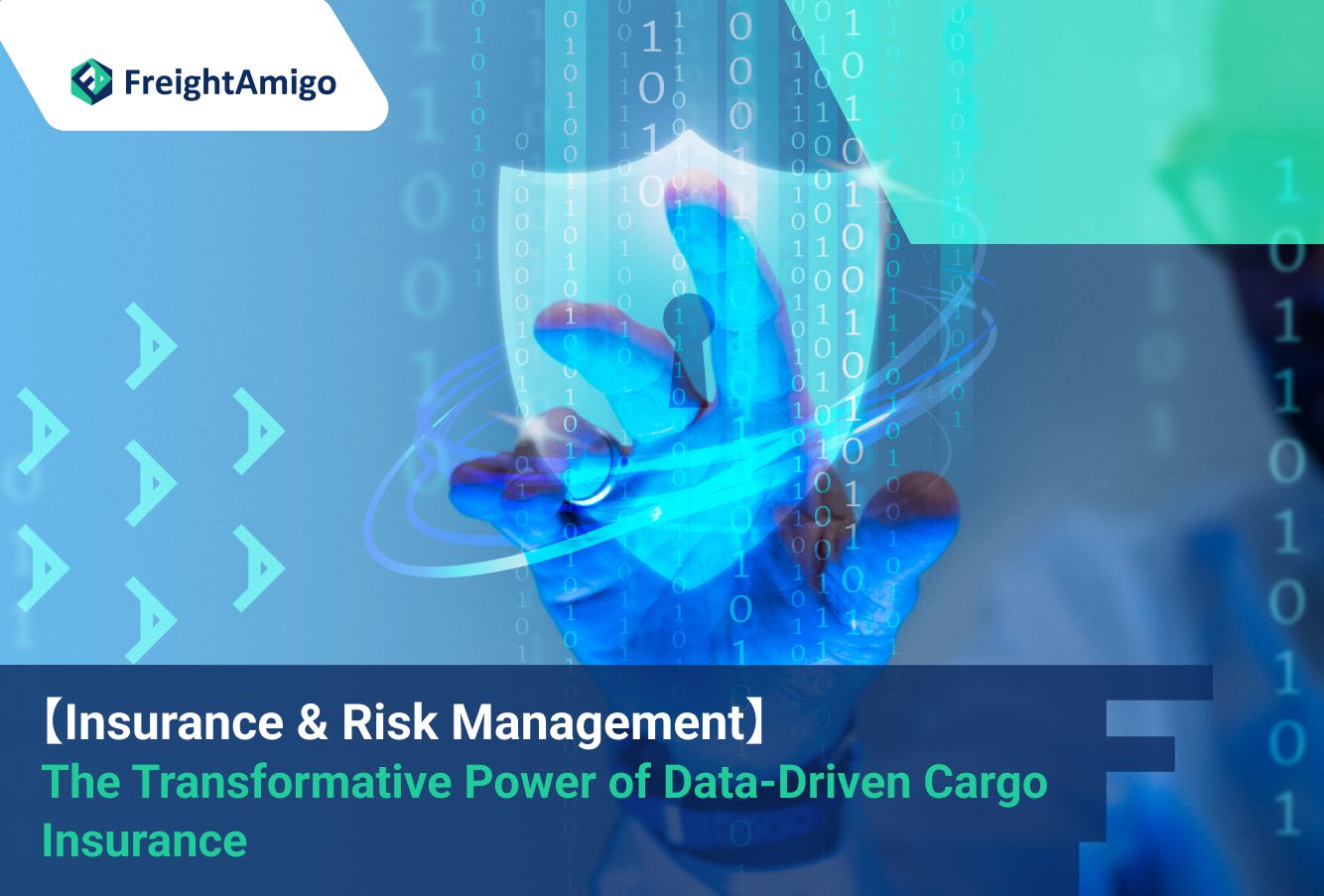January 31st, 2024: Maya Wong– Marketing Analyst at FreightAmigo
In today’s digital age, data analytics is playing an increasingly significant role in various industry sectors, including the cargo insurance industry. More and more insurance companies are leveraging the power of data analytics to enhance their risk assessment, claims management, and underwriting processes, thereby streamlining their operations and offering better services to their clients. This article explores the transformative power of data-driven cargo insurance and how it is revolutionizing the insurance landscape.
Want to compare the best Express, Air Freight, Sea Freight, Rail Freight & Trucking rates so as to have better control on cost?
Importance of Data Analytics in Cargo Insurance
Data analytics is the science of examining raw data with the purpose of drawing conclusions about that information. In the context of cargo insurance, data analytics can provide valuable insights into multiple aspects of insurance operations, from risk assessment and underwriting to claims management and customer service. The utilization of data-driven cargo insurance can lead to more accurate risk assessments, streamlined claims management, and improved underwriting processes, ultimately enhancing the overall efficiency and effectiveness of the insurance operations.
Accurate Risk Assessment
One of the most significant benefits of leveraging data analytics in cargo insurance is the ability to conduct more accurate risk assessments. Traditional risk assessment methods often rely on historical data and manual processes, which can lead to inaccuracies and inefficiencies. With data analytics, insurers can analyze vast amounts of structured and unstructured data from various sources to identify patterns, trends, and correlations that can help in assessing the potential risks associated with insuring a particular cargo shipment.
Streamlined Claims Management
Claims management is another area where data analytics can bring significant improvements. By analyzing data related to previous claims, insurers can identify common reasons for claims, detect fraudulent claims, and predict the likelihood of future claims. This information can help insurers streamline their claims management processes, reduce costs, and improve customer satisfaction.
Improved Underwriting Processes
Data analytics can also enhance the underwriting processes in cargo insurance. By analyzing data related to the cargo, its transportation, and the insured’s past claims history, insurers can make more informed decisions regarding the pricing and terms of the insurance policies. This can lead to more accurate pricing, better risk management, and improved profitability for the insurer.
How Big Data Works in Cargo Insurance
The application of big data in cargo insurance involves the collection, processing, and analysis of vast amounts of data from various sources. This data can include information about the cargo, its transportation route, the carrier, the insured, and other relevant factors. Once collected, this data is processed and analyzed using advanced analytics tools and techniques, such as machine learning algorithms and predictive modeling.
Predictive Analytics in Cargo Insurance
Predictive analytics is a key component of data-driven cargo insurance. It involves the use of statistical techniques and machine learning algorithms to analyze historical data and make predictions about future events. In the context of cargo insurance, predictive analytics can be used to forecast potential risks, predict the likelihood of claims, and optimize the pricing and terms of insurance policies.
Real-Time Tracking and Monitoring
Another important aspect of data-driven cargo insurance is the ability to track and monitor cargo shipments in real-time. This can be achieved through the use of IoT devices and sensors installed on the cargo and the transportation vehicles. The data collected by these devices can be analyzed in real-time to monitor the condition of the cargo, track its location, and detect any potential issues or disruptions. This can help insurers respond quickly to any issues and mitigate the risks associated with cargo transportation.
Advanced Analytics for Risk Mitigation
Advanced analytics can play a crucial role in risk mitigation in cargo insurance. By analyzing data from various sources, insurers can identify potential risks and take proactive measures to mitigate them. This can include adjusting the pricing and terms of the insurance policies, implementing additional safety measures, or recommending alternative transportation routes or methods.
Benefits of Data-Driven Cargo Insurance
The use of data analytics in cargo insurance brings numerous benefits, including improved efficiency, cost reduction, enhanced customer service, and increased competitiveness.
Improved Efficiency
One of the main benefits of data-driven cargo insurance is improved efficiency. By leveraging data analytics, insurers can automate various aspects of their operations, from risk assessment and underwriting to claims management and customer service. This can lead to significant time and cost savings, as well as improved accuracy and consistency in decision-making.
Cost Reduction
Data analytics can also help insurers reduce costs in various ways. For instance, by improving the accuracy of risk assessments, insurers can reduce the likelihood of underpricing or overpricing their policies, thereby optimizing their revenue and profitability. Additionally, by streamlining the claims management process, insurers can reduce the time and resources required to process claims, leading to further cost savings.
Enhanced Customer Service
Data analytics can also enhance the level of service provided to customers. By leveraging data analytics, insurers can provide more accurate and timely information to their clients, respond more quickly to claims, and offer more personalized and tailored insurance solutions. This can lead to increased customer satisfaction and loyalty, as well as improved reputation and competitiveness for the insurer.
Increased Competitiveness
Finally, data-driven cargo insurance can help insurers gain a competitive edge in the increasingly competitive insurance market. By leveraging data analytics, insurers can offer more innovative and differentiated insurance solutions, respond more quickly to market changes, and make more informed and strategic decisions. This can help them stand out from their competitors and attract and retain more clients.
Real-World Applications of Data-Driven Cargo Insurance
Data-driven cargo insurance is not just a theoretical concept; it is already being applied in real-world scenarios with significant results.
Improved Risk Assessment
Insurance companies like AIG and Allianz are leveraging data analytics to improve their risk assessment processes. By analyzing vast amounts of data from various sources, these insurers can identify patterns and trends that can help them assess the potential risks associated with insuring a particular cargo shipment. This allows them to price their policies more accurately, reduce the risk of underwriting losses, and improve their overall profitability.
Streamlined Claims Management
Insurers like Zurich and AXA are using data analytics to streamline their claims management processes. By analyzing data related to previous claims, they can identify common reasons for claims, detect fraudulent claims, and predict the likelihood of future claims. This allows them to streamline their claims management processes, reduce costs, and improve customer satisfaction.
Enhanced Underwriting Processes
Insurers like Swiss Re and Munich Re are leveraging data analytics to enhance their underwriting processes. By analyzing data related to the cargo, its transportation, and the insured’s past claims history, they can make more informed decisions regarding the pricing and terms of their insurance policies. This leads to more accurate pricing, better risk management, and improved profitability.
Conclusion
In conclusion, data-driven cargo insurance is a powerful tool that can significantly enhance the operations and performance of cargo insurance companies. By leveraging the power of data analytics, insurers can conduct more accurate risk assessments, streamline their claims management processes, and improve their underwriting processes. This can lead to significant benefits, including improved efficiency, cost reduction, enhanced customer service, and increased competitiveness. As the insurance industry continues to evolve and adapt to the digital age, the role of data analytics in cargo insurance is only set to grow.
There are different options for cargo transportation. If you want to choose the most convenient and suitable solution, it is best to have the full support of logistics experts! If you are planning to ship goods overseas, please go to the FreightAmigo page for inquiries.
===
Read More:
【Simplify Your Financial Analysis with a Landed Cost Calculator】 The Key to Smart Decision-Making
【Cargo Insurance】 Protecting Your Business and Streamlining Global Shipping
【Emerging Technologies】 Blockchain Revolutionizing Freight Technology and Supply Chain Management
If you have any inquiries on logistics/supply chain, feel free to contact FreightAmigo now:
Chat with us online | Hotline: +852 28121686 | WhatsApp: +852 27467829



